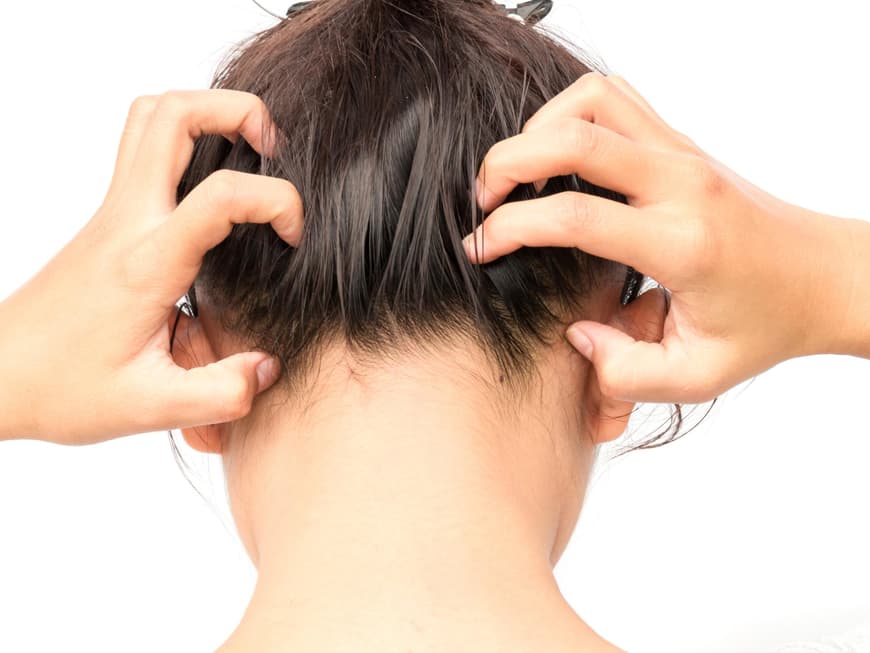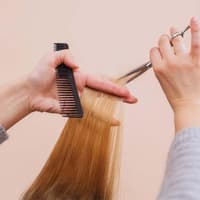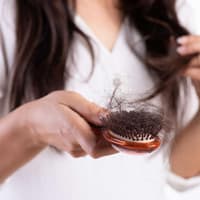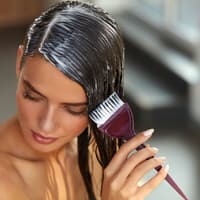
Itchy scalp: There can be various causes
Every second woman suffers from an irritated scalp. The causes of an irritated scalp can be very different. An itchy scalp is not only very unpleasant for those affected, the scratching also damages the skin and hair surface, scientists have discovered. The scalp is one of the most sensitive areas of the body and reacts immediately to care mistakes, poor nutrition or hormonal changes. That's why it's important to treat and care for it well - sometimes even good old-fashioned home remedies can help.
Itchy scalp: food triggers
An itchy scalp can also be the result of a hidden allergy. The reaction can be caused by hair care products or food, for example. Allergenic substances activate the release of the body's own substance histamine, causing tingling, itching or burning on the scalp.
Even without allergies, an unbalanced diet or certain vitamin and mineral deficiencies can lead to an itchy scalp. Stress, hormonal fluctuations and a rapidly oily scalp encourage the development of Malassezia yeast. This in turn increases the production of unsaturated fatty acids, which can irritate the scalp. Iron deficiency in particular can lead to an itchy scalp! Some people also complain of itchy scalps after drinking alcohol or eating hot spices.
Itchy scalp due to too little fluid
Very often, the reason for an itchy scalp is an imbalance in moisture, which can lead to a dry and itchy scalp. In addition to hair roots, sebaceous glands and sweat glands, our scalp also contains immune defense cells and nerve endings, which together perform important functions such as fluid exchange and temperature regulation. If we drink too little, this also has a major impact on our scalp. You should therefore stick to the generally recommended 1.5 liters a day.
What to do about dry scalp?
Our scalp also starts to itch when it is extremely dry. There are many causes: Too frequent hair washing and daily blow-drying dry it out. The wrong shampoo can also irritate the skin.
This helps: Massage the scalp with a few drops of olive oil and leave on overnight. Only use mild shampoos for hair care and dilute with water when washing. Shampoos should be free from additives such as colorants, preservatives, parabens, silicones and fragrances. Silicones in particular cling to the scalp and seal it. Some silicones are also suspected of being harmful to health. Avoid blow-drying your hair if possible, as this also dries out the scalp. In some cases, however, a dry, itchy scalp is also caused by an illness. If the symptoms do not disappear, you should see a doctor.
What to do about dandruff?
Dandruff occurs when the scalp is too dry or too oily. If the scalp is dry, the dandruff tends to be small; if the skin is oily, it can form quite large flakes. Cause: The skin's renewal process is greatly accelerated. However, stress, a warm and humid climate, an unhealthy diet and changes in the hormone balance can also be triggers.
What can help: Rinse the scalp with a mixture of nettle tea and apple cider vinegar.
Or use the following products:
Australian Bodycare 3-piece scalp care set for approx. 29.50 euros
The classic tea tree shampoo for approx. 20.60 euros or
or the invigorating hair tonic from Weleda for approx. 9 euros
What to do with seborrheic eczema?
Typical symptoms of the inflammation are white-yellowish scales, reddening of the skin and the formation of blisters. Itching may or may not be present. Although this skin rash is not contagious, it is very unpleasant, as the inflammation can spread from the scalp to the face. The cause is still unclear, but genetic causes are suspected. Fungi are also thought to be responsible for eczema. However, one thing is largely certain: seborrheic eczema is caused by an overactive sebaceous gland.
This helps: No home remedy can help here, only a dermatologist can treat this condition.
Residues of shampoos, conditioners and co.
Many hair care products contain silicones, for example, which can build up on the scalp as product residue if they are not washed out properly. Product residues can also cause itchy scalps as they dry out and irritate the scalp.
Itchy scalp due to fungal infestation or lice
If the scalp is red and peeling, it could be a skin fungus. In this case, consult a dermatologist, as there is a risk that the fungus can spread to the body.
A lice infestation can also cause the scalp to itch, as can mites or fleas.
Home remedies for an itchy scalp
If you suffer from an itchy scalp, you can first try a few home remedies to provide relief. These little helpers have proved particularly effective:
1. tea tree oil
This natural remedy is suitable for all kinds of skin conditions. Thanks to its antibacterial effect, it can prevent and combat inflammation. Tea tree oil is available in pure form or already contained in various care and cosmetic products.
2. apple cider vinegar
Apple cider vinegar helps to rebalance the natural pH value of the scalp. Thanks to its anti-inflammatory properties, vinegar can combat yeasts and viruses that may cause itchy scalps. To do this, wet the hair. When it starts to dry, mix half a cup of apple cider vinegar with half a cup of water and apply to the scalp. Leave the mixture on for about 10 minutes and then wash your hair as usual. Repeat the application weekly.
3. coconut oil
As itchiness on the scalp is often caused by dryness, a sufficient supply of moisture is particularly important. Coconut oil is an excellent source of this! This home remedy also has an antibacterial effect. Apply a little coconut oil to the scalp and massage well. Leave on for around half an hour and then wash your hair as usual. This can be repeated up to three times a week.
4. baking soda
Baking soda is a popular remedy for combating dandruff or fungi. It is particularly suitable due to its antibacterial effect! To use, first rub the scalp with a little olive oil. Then mix a tablespoon of baking soda with a tablespoon of water and massage onto the skin. Leave the paste on for about 15 minutes, then rinse thoroughly with water.
Itchy scalp: When to see a doctor?
Normally, an irritated scalp is not a dangerous problem and often disappears after a short time with a little care. However, if the itchy scalp lasts longer than four weeks, there is pain or symptoms such as a rash or blood can be seen, those affected should consult a dermatologist for clarification. You should also see a dermatologist if hair loss occurs in connection with an itchy scalp. The exact cause must then be clarified urgently! In any case, avoid scratching constantly - if the tissue becomes scarred, the hair may not grow back!
Date: 23.04.2020






